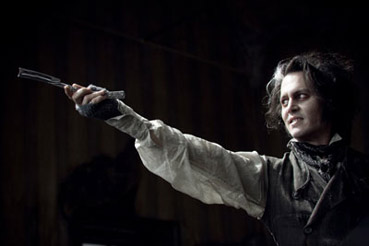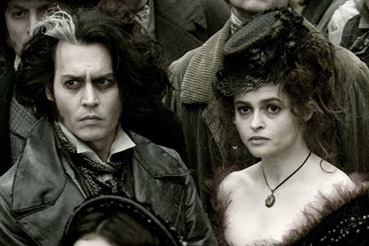"You know, the thing about the stage is you can virtually
do everything on the stage that you can do in the movies;
it just depends on the audience's imagination." |
Composer/lyricist Stephen Sondheim |
When I saw how acclaimed Broadway director Hal Prince staged the Act II number 'Johanna' (alas on video as I was not there in person in the stalls mouth open, staring agog) it was the first time I was aware that theatre could do something film could not. Blasphemer! Theatre is, in part, interactive. That's a given. Although you and your eye are directed to look at certain parts of the action, it is your imagination that stitches said action together and makes meaning in the most absurd juxtapositions. Look at the level of processing your brain spins through just to make artistic and logical sense of what you're seeing – usually something several thousand steps away from anyone's idea of reality. In fact, on stage, the more real something appears, the more unreal contextually it is perceived. Not so in cinema.

On a raised dais, demon barber, Sweeney Todd, madder than a hornet with toothache, relentlessly slices his patrons' throats while singing his acceptance of the loss of his daughter, Johanna. On the lower left of the stage is the sailor, Anthony, also singing but out of love for Sweeney's daughter, as he desperately searches for her. Johanna herself is locked in an asylum singing on the right hand side of the stage beneath her barking father (real name Benjamin Barker, naturally). The song – essentially a quartet, the fourth singer being the mysterious beggar woman - is a masterpiece. Forget the overlapping harmony, the multilayered meaning upon meaning, the sheer brilliance of its dark daring and wit. It showcases something Sondheim has never been accused of that often – eliciting feeling, this time an almost painful emotion of desolate loss and towering obsession. This song presages the dark inevitability of how revenge must end. It almost does too much, certainly for only five viewings and god knows how many run-throughs of the soundtrack.
Well, the same theatrical staging knocked out a certain Mr. Timothy Burton and ten years ago he approached Sondheim for the rights to shoot what has to be said was, theatrically speaking, a failed masterpiece. At Sweeney's opening performance in 1979, half the audience left at the interval. Wimps! Burton wasn't able to secure financing back then and the project went back to limo. It's the oddest mix of elements – a Broadway musical about a serial killer who slices up his clientele so they can be baked in pies and consumed on the premises. Deep breath. OK. Sondheim, a self-confessed anglophile and never one to shirk the unpalatable, intended Sweeney to be a love letter to London. Lines like "There's a hole in the world, like a great black pit and it's filled with people who are filled with shit and the vermin of the world inhabit it and it goes by the name of London..." may have been misconstrued. Burton has come along and cloaked Sweeney with his authorial stamp, one that nestles in comfortably with Sondheim's exquisite gothic horror musical, four words that fought tooth and nail not to be placed side by side let alone in their very own sentence.
The plot, in short, is relatively straightforward. London at the end of the 19th century; Barber Benjamin Barker was a happy family man until the venal Judge Turpin took a fancy to his wife and banged him up on a trumped up charge and had him shipped, unjustly, to Australia. The Judge sexually abuses Lucy, Barker's wife, sending her, well, barking. The Judge subsequently adopts the Barkers' daughter Johanna. Barker escapes, gets back to London and takes on the identity of Sweeney Todd vowing revenge on those that ripped his life from him. In love with Sweeney, is Mrs. Lovett, the overtaxed and under-blessed with reality pie maker and it's above her premises where Sweeney sets up shop. With the Judge under his blade, Sweeney fails to strike, goes, well, barking and in turn provides Mrs. Lovett with a line of fresh (human) meat for her pies... Let's just say there are no happy endings but then this cannot possibly be a surprise... And the blood!
To say Tim Burton's sensibilities are matched with the material is so far beyond stating the obvious, I won't even make that point. Damn. Burton's London is a grimy, blue-grey, dank world full of shadows and gunmetal grey skies. These are not so much mean streets as has-been streets as England prepares to pare the industrial age into something a little more sophisticated. The rolling cogs of machinery are in place as if the spirit of David Lynch's production designer on The Elephant Man is whispering in Burton's ear. It looks gorgeous in that way that movies designed to look dirty and cold can look gorgeous. We're not talking fruit bowl colour gorgeous here. But the milieu is perfect as a hyper-bitter, calculating reality.
When the fantasy kicks in, courtesy of Sweeney's obsessive ranting, it's locked in the same world. He's so focussed and oblivious to all but revenge that he cannot imagine a world outside his own warped reality. But from Mrs. Lovett's point of view, we burst out of the movie into a splendid multicoloured version of her own twisted dreams. Sweeney sits there on the beach darkly impassive with the correct clothing (hooped swimming costume, well, it's Burton) looking like a wasp-sting wrapped in canvas. Mrs. Lovett reminds Sweeney to "Bring along your chopper!" As you do.

Sweeney Todd: The Demon Barber of Fleet Street (to give it its full title) was recently and deservedly Oscar nominated for art direction and costume. There's also a nod to Johnny Depp as best actor. Chances are that award is already ear marked for Daniel Day Lewis. How can actors in a musical compete at an awards ceremony? Depp's brooding and maniacal Sweeney is convincingly delivered and I suspect that the Academy wanted to reward this daring actor for saving Hollywood's ass on a number of occasions. Just check out the choices he's made in the last ten years and try to regard them before they were huge hits and imagine what guts it took to commit to those roles). Yes, Captain Jack Sparrow is enormous as one of Disney's biggest character hits but... Before Capt. Jack, the last pirate movie produced lost so much money that anyone betting on a mascara'ed, asexual, foul breathed, golden toothed, ear-ring wearing fop would have been regarded as beyond mad. Depp makes all these risks seem like sure fire, economically solid, slam dunks. Not so. OK, the Pirates sequels, sure. Depp recorded "My Friends", Sweeney's love song to his silver handled razors, to convince himself and others that he could pull off the singing. His London accent is sometimes over-egged just slightly but as Sweeney is hardly a Ken Loach character aching for reality, this didn't deter. As for his vocal performance, it's good. It's not Len Cariou (the original stage Sweeney) and hasn't that power and steely emphasis but Depp plays to his strengths and he makes Sweeney, vocally, more calculating, more inward living. It's a performance of some subtlety (if this crazy coiffeur can have levels).
Matching him note for note is Helena Bonham-Carter in a role that she lobbied hard for. Now according to whom you believe in the media (careful), Bonham-Carter had to audition for Sondheim (as she tells the story) and it took three months for her to secure the role of Mrs. Lovett. Let's take a look from the other side. Sondheim, in my book, the only artistic giant in the American theatrical musical scene, is not stupid. He stands to gain in all sorts of ways if Sweeney gets made (Depp, Burton's cinematic alter ego, is already in place). So what to do when the director's wife is auditioning for Mrs. Lovett? Make her sweat, sure, but was he going to ever turn her down? I'm going to take Bonham-Carter's word for it because I admire her and although like Depp, her vocals don't have the punch of her theatrical counterpart, Angela Lansbury, she's sly and funny enough to pull off the deranged dreamer. The chemistry between the brooding barber and his fantasist lady friend is securely in place and this gives the movie its albeit twisted soul.
Yes, it's nasty (the blood letting is uncompromised and the sickening thuds of the heads crashing on concrete elicit a few measured groans from the audience) but rightly so. As the awful events trundle horrifically to their conclusion, you get a sense that we may have seen one throat cut too many or one head too many smash into the cellar floor but that's the material that worked so well (if not popularly) on stage. Burton largely keeps the plot identical to the stage show but movies are literal beasts at the worst of times (the advantage/problem with photo-realistic presentations) and at times it's literally over-kill.
Many reviews have proclaimed Burton's movie as a mini-masterpiece and each seems to be uniquely concerned over how well it may do at the box office. At the time of writing, Depp's star power has pulled in enough to cover production costs and it's European run has just started so that's good news. But no production company pours $50 million into a musical horror movie without some guarantees. Depp is certainly one. But whether it goes on to haemorrhage cash (unlikely) or take its place as a genuine artistic triumph, what does it matter? Is it too much to ask or even hope for both?
I'll leave the last word to the only lost musical number I really missed – the chorus delivered "Ballad of Sweeney Todd":
Swing your razor wide, Sweeney,
Hold it to the skies!
Freely flows the blood of those who moralise!
|